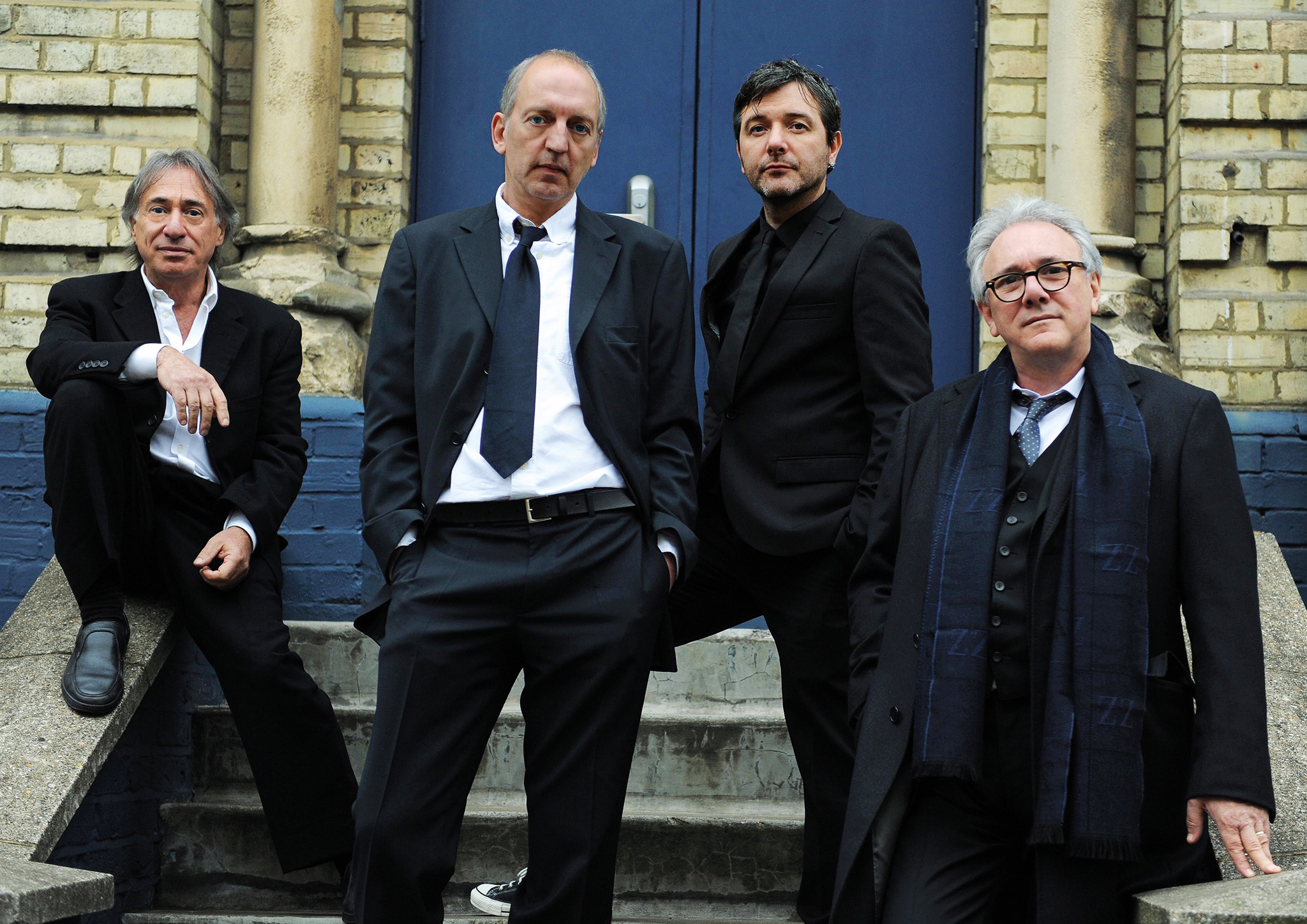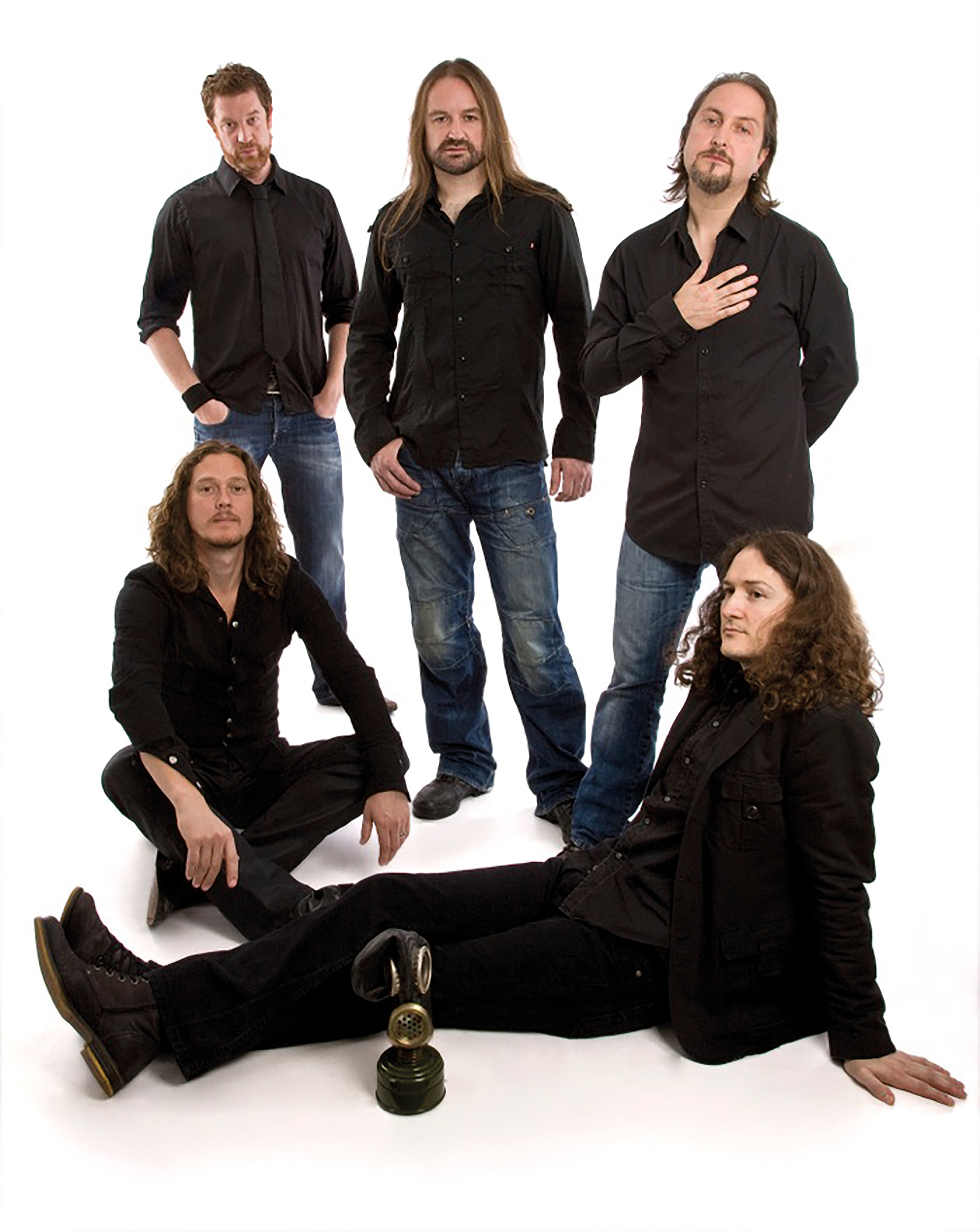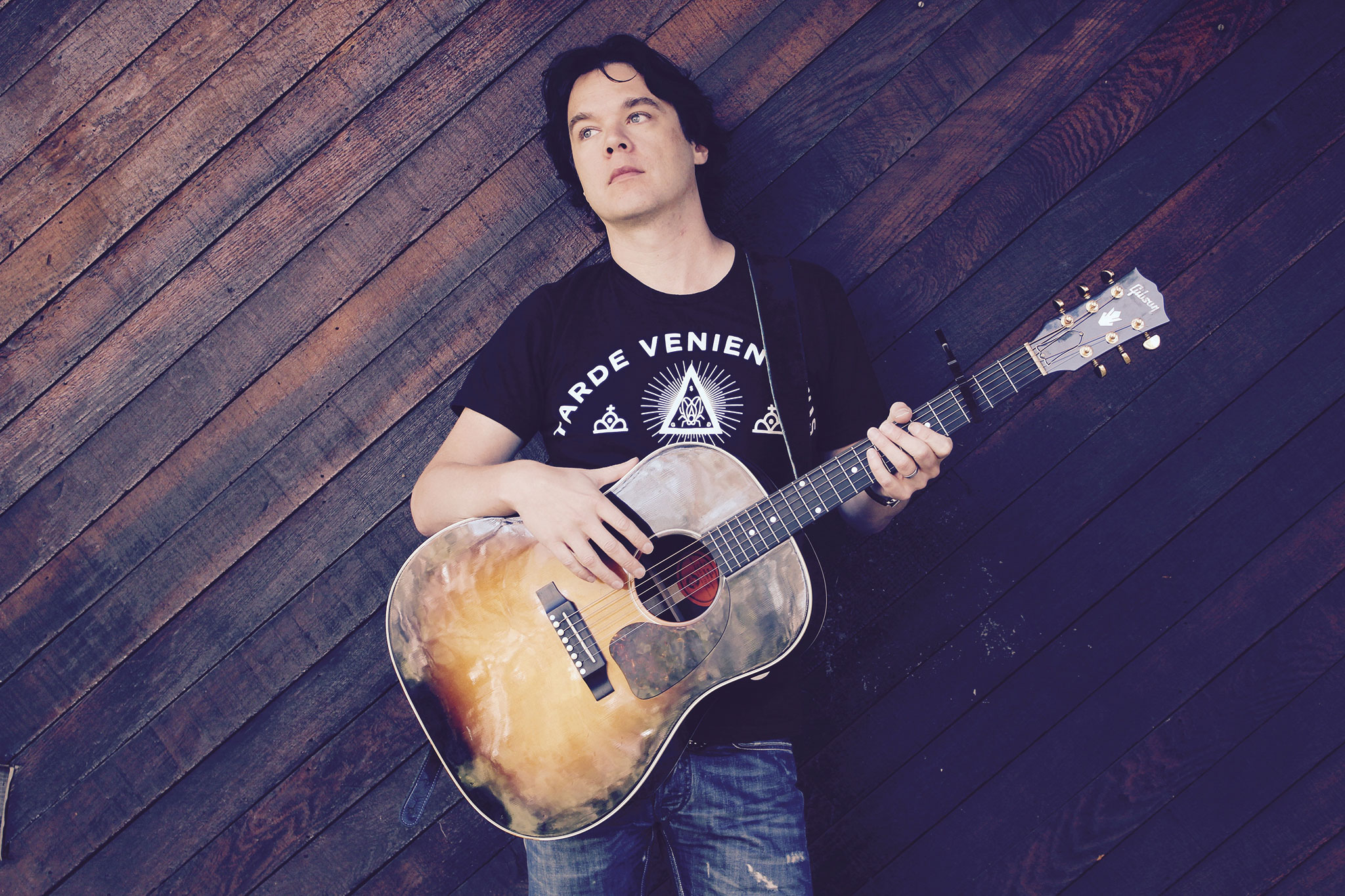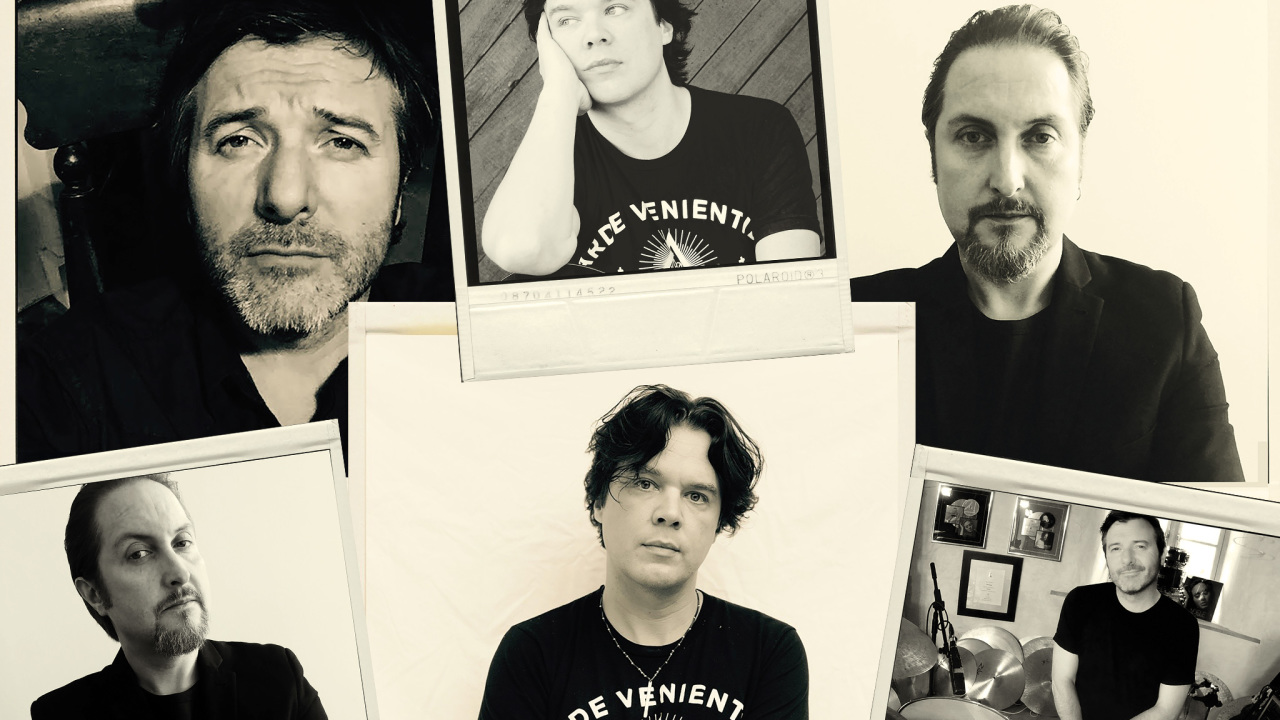It was a great experience playing with Take That – they’re a great bunch of guys and, it turns out, they’re all prog rock nuts!”
This Oceanic Feeling bassist Lee Pomeroy has just come off tour with the stadium-straddling boy-turned-man band. His statement might be startling to Prog readers, but we must, in the interests of journalistic clarity, explain further. While we’re sure Gary, Mark and Howard aren’t averse to a touch of more challenging musical fare, Pomeroy is referring to Take That’s touring backing musicians, of whom he is one.
It was that kind of freelance work with some of pop’s biggest names that helped bring three prog-loving musical maestros together to make an album, which, as singer, guitarist and producer Chris Braide puts it, offers “widescreen pop with prog sandals on”. And This Oceanic Feeling’s combination of a top‑drawer tunesmith’s chops with subtle but skilled playing and thoughtful, thematically linked lyrics makes their debut release Universal Mind one of the best commercial rock albums you’ll hear this year.
We all felt able to express ourselves and didn’t feel like we had to stick to any boundaries.
So how exactly did prog cross paths with its old frenemy pop on this occasion? Pomeroy sits in a central London hotel bar – the kind of place that becomes all too familiar in his line of work – and explains how he came to the Take That gig, and to TOF, via the kind of long and winding route familiar to a lot of session musicians. He started out as an 80s teenager who, he says, was once beaten up for trying to put A Trick Of The Tail on his sixth-form stereo, before his instrumental prowess led him to hire out his services to a startlingly diverse array of employers.
For all his versatility, after over 20 years as a hired gun, another thing he has in common with other in-demand session players is a penchant for prog, one that he’s only too happy to indulge in between the jobs that pay the mortgage. Drummer Ash Soan even credits Pomeroy for “turning me on to prog”, before he joined Rick Wakeman’s touring band in the early 2000s. Meanwhile, multi‑instrumentalist and songwriter to the stars Chris Braide played with both men in Squeeze in the late 90s and later formed the Producers with Soan, Steve Lipson and Trevor Horn in 2006.

ABOVE: PRODUCERS
Proving the ‘three steps of separation’ relationship many such musicians and producers have with the progressive music world, Horn was, of course, a member of the Yes line‑up that made 1980’s Drama, and the Buggles and future Art Of Noise man would have his producer’s paw-prints all over 90125,Yes’ most commercial and polarising album three years later. Braide was one of a new generation of Yes fans who was squarely on board with the sophisticated pop rock of that record, and he still counts it among his favourite LPs.
Pomeroy was a big fan too, and when he and Braide bumped into each other on various projects, they bonded over shared musical passions. He reveals: “We were both working with Paloma Faith last year and we met up for lunch in London. We ended up gassing for hours, about everything from The Beatles to XTC to progressive stuff, and also lots of synth pop – we’re both into Gary Numan for instance. Then a couple of weeks later he emailed me: ‘Mate, let’s do a band.’”
California-based Braide already had a clutch of songs he’d been toying with that ploughed a different furrow to that which would have suited the pop artists he was writing for (such as Sia, Lana Del Rey and Christina Aguilera).
“I’d written the lyrics first, which is unusual for me,” he tells Prog from his instrument-strewn Topanga Canyon studio. “Sometimes I’d just be lying alone in bed, writing down thoughts. Then I got to the studio and I had the lyrics ready – it was like having a co-writer. I’ve worked with people like Chris Difford, who is a genius lyricist, and it’s a joy to have words to work with when you write music because you can go to strange places you don’t normally go.”
As a result, while none of the trio would go so far as to call this a concept album, there’s a strong lyrical theme running through it, which reflects Braide’s enduring interest in psychoanalysis and mental and spiritual health.
“I’ve always read those books, searching for answers,” he explains. “And since moving out to America [in 2010] and being out in the mountains, I’ve been through a strange transitional period, feeling not quite at home, a bit of an alien.”

ABOVE: Headspace
Indeed, This Oceanic Feeling are named after a sub-Freudian term coined by writer Arthur Koestler in his suicide note to describe the sense of peace he felt when he and his wife chose to self-euthanise together rather than see him succumb to terminal illness. And the album title, Universal Mind, is a Buddhist term “about finding your inner peace and being happy with who you are”. “I’m scared of mentioning the ‘B’ word,” Braide says, his no-nonsense Cheshire accent broadening slightly, “because every third-rate celeb claims to be a Buddhist now, don’t they?”
Braide’s mind certainly seems to be on higher things than ‘boy meets girl’ on contemplative musings such as Lie Detector, and Karma Camera’s talk of ‘you and your thought crimes’, but these songs also showcase his startling talent for creating stylish pastiches of intelligent pop styles and lacing them with subtle prog decoration.
You can hear captivating echoes of Prefab Sprout on Johnny Tragic’s pithy third-person character sketch, its lyrical barbs cloaked in breathy backing vocals and anthemic soft-rock swell. Radio is immediately redolent of Roxy Music’s Oh Yeah. But then you can also detect some of Pink Floyd’s broader strokes in the floaty, expansive, soul-searching feel of the title track, while the florid flashes of Fairlight keyboard on Lie Detector and the title track will envelop listeners in a warm, proggy glow.
Being able to play music is such a fantastic thing – it’s a gift.
You sense that making this record felt liberating for these three. After all, they make most of their earnings essentially from playing and writing music for other people, so the chance to do their own thing must be a real release. You can hear it in the joyous quirkiness of Logotherapy, a flagrant (and really pretty neat) pastiche of The Police’s Nabokov-bothering brand of fidgety punk pop, on which they manage to loosen the belt buckles on their own fastidious professionalism.
“That sound is two large glasses of Chardonnay,” admits Soan of the hyperactive rhythm section that underpins it. “Chris sent me the track and I had a crack at it one night after half a bottle of wine, sent it back as ‘a rough’ and he said, ‘I love it!’”
That may be one reason why the album, while being a polished, radio-friendly rock record, also sounds like a labour of love (“No labour really, just love,” corrects Soan), produced by three men who work together as instinctively as a band who’ve grown up playing in a garage together. This despite the fact they never actually met during its recording.
“Chris would write the basic song,” Pomeroy recalls, “and send it to Ash to add drums, and because me and Ash have played together for years, when I hear his playing, I know exactly where to sit with him. Then we’d communicate via email or Skype and one of us would say, ‘Okay, maybe we could extend this bit, or put this part together with that.’ We all felt able to express ourselves and didn’t feel like we had to stick to any boundaries, which meant we were bouncing ideas off each other, quite a few of which ended up as melody lines or riffs or whatever.”
But unlike some albums made by a meeting of several highly able musicians keen to ‘express themselves’, this added up to more than the sum of its parts due to Braide’s exceptional songs and strong lyrical threads that give it resonance and immediacy.
“I’m a big Kate Bush fan,” says Braide, “and there were always strong themes running through her albums. Isn’t that how it’s supposed to be? You buy the single as a taster and now you can enter the artist’s world through the album. I remember Kate saying she lamented the passing of the album as an art form – I’m with her on that, and of course that’s one thing that has always been absolutely key to prog. Not that this is a prog record with a capital ‘P’, but I think that’s another aspect where its influence is felt.”
“You can relate to it straight away as a listener,” reckons Pomeroy. “I mean, a song like Johnny Tragic, talking about someone ‘washing diamonds down the drain’ – we’ve all seen talented people throwing it all away. And then the idea of music as therapy on Radio and I Play Debussy – well, music’s certainly always kept me sane.”
There’s also real light and shade on this record, from the euphoric release of those two tracks to the malevolent warnings of Karma Camera and the sense that being untrue to yourself is the road to ruin on Lie Detector.

There’s relatively little here that’s cloaked in metaphor either. ‘You need repair, intensive care,’ Braide concludes on the short, brooding Intensive Care. ‘You’re too attached to the boy, you lost your way and lost your joy.’
“My wife Olivia said, ‘You’re revealing too much of yourself, you know that, don’t you?’” says Braide. “But that’s my way of writing. I always loved John more than Paul in The Beatles – he was always writing exactly what he was feeling.”
Yet the sense of an emotional journey – and a pronounced happy ending – is completed when the penultimate, eight-minute Season Of Light concludes with a reprise of the title track’s chorus, and we’re told: ‘You are connected to all you see and hear/Just let it go and you will find a new state of grace/I know you can make it back, you know that this fear will pass/The panic and loss, mountains of remorse/Let sleeping dogs lie, let love light the way.’
For three people who make a living from music but have just made a real busman’s holiday of an album, it’s a suitably, well, oceanic feeling to sign off with. “One of the things that struck me writing this album,” says Braide, “was that being able to play music is such a fantastic thing. It’s a gift, and sometimes you just have to enjoy it for its own sake.”
Ain’t that the truth.
Universal Mind is out now via Cherry Red. See www.thisoceanicfeeling.com for more information.

